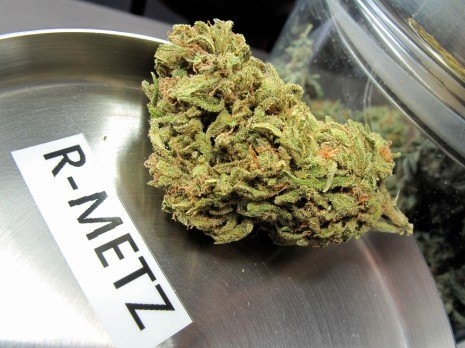
Dangerous Minds pal, Michael Backes (who named the above strain) writes:
“Most books about marijuana are hampered by shoddy research and threadbare science. As cannabis legalization and decriminalization approaches its tipping point in the US, it’s refreshing that Dr. Julie Holland has published, The Pot Book, the most comprehensive overview available of cannabis, its medical uses and societal ramifications. What makes “The Pot Book” truly significant is the depth of its coverage and the breadth of its fifty contributors.
Dr. Holland, who spent a decade as an ER psychiatrist at Bellevue Hospital in New York City, is also the author of The Ecstasy Book, the standard work on MDMA and its medicinal applications. For The Pot Book, Holland has convened a who’s who of esteemed contributors, ranging from Dr. Raphael Mechoulam, the discoverer of THC, to contemporary social critic, Douglas Rushkoff. The book covers everything from the latest on cannabis botany from Dr. Lyle Craker, the UMass professor that is attempting to break the US government’s monopoly on research-grade cannabis to Dr. Marsha Rosenbaum’s essay on how to speak to kids about marijuana. The book is supplemented by a website with additional articles and interviews that didn’t make the cut for the book, plus a collection of excellent links to cannabis science and sociology. All proceeds from sales of the book go to support research into cannabinoid medicines.”
Dr. Julie Holland writing on The Pot Book website:
After three years of putting this book together, I’m convinced that cannabis can be re-introduced to physicians and patients as the multifaceted medicine it once was. I think what we will see in the next decade or so is an explosion of research into the therapeutic use of cannabinoids as medications. If you’d like to donate to the Holland Fund for Therapeutic Cannabinoid Research, please click here.
Before pot was illegal, it was a medicine used for thousands of years to treat everything from muscle spasms to insomnia. Cannabis has powerful anti-inflammatory activity, it can act as a free-radical scavenger, and most importantly, cannabis has anti-cancer activity. Cannabinoids can kill cancer cells by apopotosis (triggering programmed cell death) while sparing healthy cells, and can also prevent tumor blood supplies from forming, which is called angiogenesis.
Cannabinoids also have a pro-metabolic effect, meaning they may be helpful in stopping the progression of diabetes (partially through its anti-inflammatory action on the cells of the pancreas), as well as helping to normalize blood sugar and cholesterol levels.
Cannabis is a medicine that can slow the prevention of atherosclerosis (hardening of the arteries, the cause of many heart attacks and strokes) and can modify autoimmune diseases including arthritis, Chron’s disease, and Multiple Sclerosis. (Cannabis doesn’t just relax the spasming muscles and bladders of MS patients; it actually seems to modify the course of illness and may slow neurodegeneration through its neuroprotective effect. The United States has taken out a patent on the use of cannabis as a neuro-protectant, though they continue to keep the plant in Schedule I, reserved for drugs with the highest potential for abuse and no medicinal use. Groups of physicians and nurses including the American Medical Association have requested a review of this scheduling.
But there are other important uses of this plant. Cannabis seeds are a complete vegetarian protein and can be used as food for people, livestock, and birds. Hempseed oil not only provides the exact ratio of essential fatty acids our bodies need, but it can also be used as a fuel. Hempseed oil is a renewable fuel source, which could decrease our reliance on foreign oil. Hemp (the non-psychoactive stalk of the cannabis plant) can make many consumer goods including paper (decreasing deforestation that complicates our climate maintenance) rope, canvas, and clothing more absorbent than cotton. Importantly, with compostable cellulose, hemp can replace our current plastic bag and Styrofoam “plastic vortex”/landfill crisis.
Cannabis is an ancient medicinal plant used for thousands of years until it was made illegal in 1937, soon after alcohol prohibition was repealed. We are currently imprisoning more people than any other country on the planet, with nearly half of our prisoners serving time for drug offenses. New York City, where I practice medicine, arrests more people for marijuana offenses than any other city in the US. Although Caucasians constitute the majority of pot smokers, African-Americans and Latinos experience a disproportionate number of marijuana-related arrests.
Renewable bio-fuel, food, rope, canvas, clothing, paper, medicine, and relaxant, and America can’t have any of it.
Because it make them laugh. As a psychiatrist, I have to tell you: This is insanity.